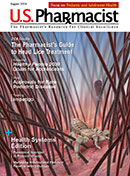In a single-center, randomized, double-blind, placebo-controlled, parallel-group study published in the European Journal of Dermatology, Michelotti et al examined the use of probiotic supplements in 80 patients with mild-to-moderate atopic dermatitis (AD). Participants were assigned 1:1 to an active group or a placebo group. The study subjects comprised males and females aged 18 to 50 years with mild-to-moderate AD based on the SCORing Atopic Dermatitis (SCORAD) index who were enrolled based on inclusion and exclusion criteria established by the researchers.
Subjects (40 in the active group and 40 in the placebo group), according to a previously prepared randomization list, received one capsule/day of food supplement or placebo for 56 days. The food supplement administered to the active group contained a probiotic mix of 1x109 colony-forming units (CFU) Lactiplantibacillus plantarum PBS067, 1x109 CFU Limosilactobacillus reuteri PBS072, and 1x109 CFU Lacticaseibacillus rhamnosus LRH020, 26 mg corn starch, and 1 mg vegetable magnesium stearate; the placebo group received a daily capsule of 99 mg corn starch and 1 mg vegetable magnesium stearate.
The results revealed that SCORAD index improved in both groups; however, the active group had a significant and progressive decrease in SCORAD index that lasted for 1 month after discontinuation. The researchers also noted that, overall, subjects receiving the probiotic mixture demonstrated enhancements in skin smoothness, skin moisturization, and self-perception, as well as decreases in SCORAD index and in the levels of inflammatory markers associated with AD.
The authors indicated that treatment with the probiotics resulted in a statistically significant improvement throughout the entire study period, and the highest levels of improvement were detected soon after 4 weeks of food-supplement intake. They also noted that the sustained clinical improvement recorded at the end of probiotic intake and during the follow-up period suggests that different treatment protocols (prolonged period, cyclic treatment, etc.) could achieve even better results and could considerably alleviate AD symptoms and thwart recurrence of the acute phase.
The authors noted that, to the best of their knowledge, this is the first clinical study assessing probiotic efficacy against AD symptoms with fast recovery and long-term performance, using a comprehensive set of clinical and instrumental parameters beyond the traditional SCORAD index. They concluded that the administration of selected probiotic strains resulted in a swift and prolonged improvement in AD-related symptoms and skin conditions.
The authors stated, "AD-related symptoms are itching, redness, dry and scaly skin and recurrent eczematous lesions. AD incidence has increased worldwide over the past several decades and affects 60% of the population, especially children. The gut microbiome can strongly influence the host immune system, providing protection against pathogens and triggering an immune protective response."
The authors added, "Probiotic intake in AD is an interesting intervention since it is directed not to the symptoms, but rather to the cause of the disease (intestinal dysbiosis). Thus, overall, more effective and long-lasting improvement can be achieved, as indicated by this clinical trial."
The content contained in this article is for informational purposes only. The content is not intended to be a substitute for professional advice. Reliance on any information provided in this article is solely at your own risk.
« Click here to return to Dermatology Update.
Related CE
$7.95 Per CE Exam or $69 for 12 Lessons





